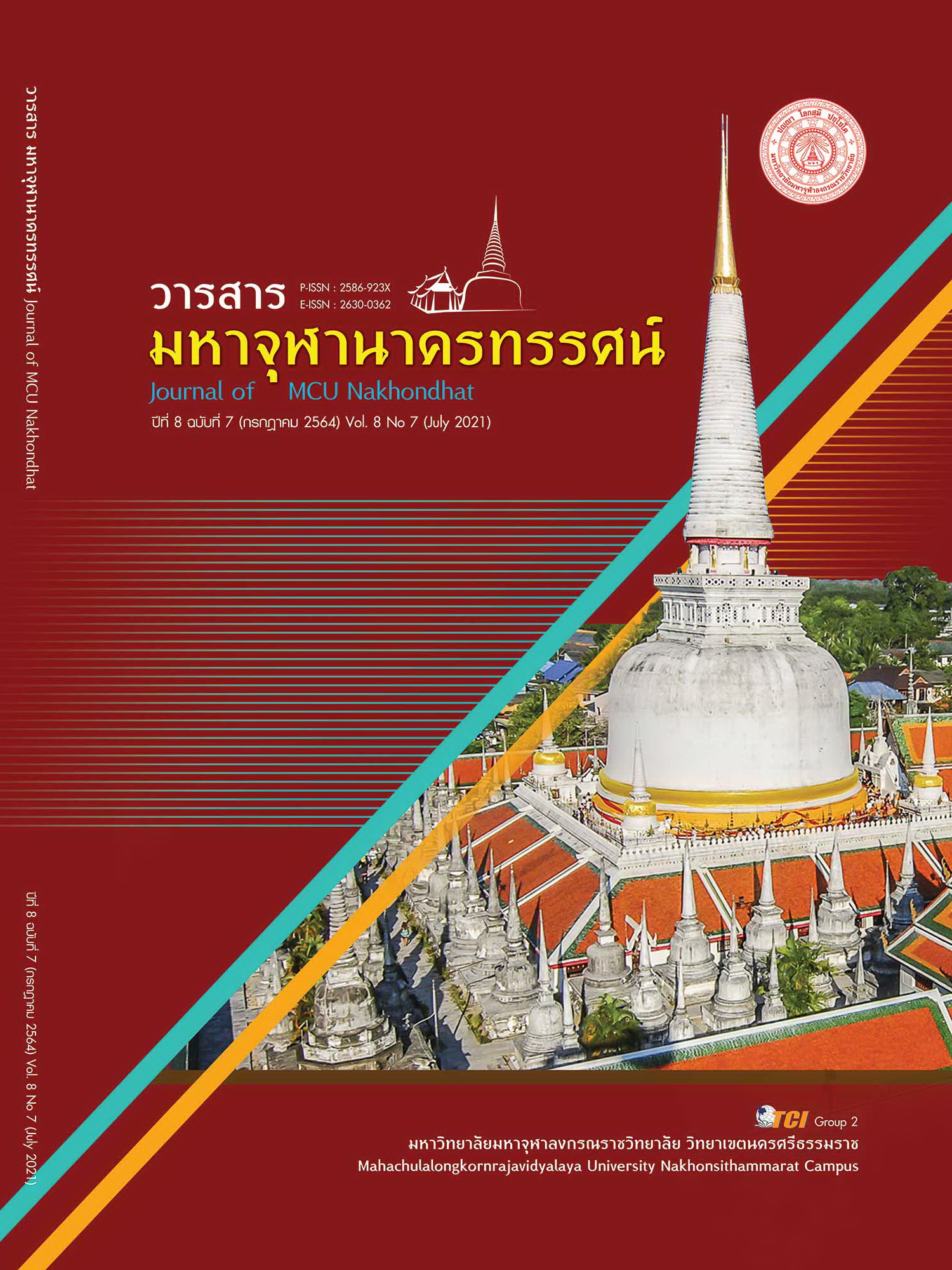BUDDHIST COUNSELING APPROACHES BASED ON THE INTRINSIC NATURE OF A PERSON
Main Article Content
Abstract
Counseling was an educational process enhancing people to know and understand themselves and the environment to be able to solve problems by themselves and develop themselves according to their potential to be a good member of society and live a happy life. Counseling was not advice but it was a tool or a process helping people who are experiencing problems that cause suffering or getting confused emotionally and mentally to understand themselves and their surroundings, enabling people to develop their potential until being able to be self-reliant, having ideas and making decisions in seeking a clear solution to a problem and a wisdom for being able to plan to eliminate the problem or suffering by themselves. Buddhist counseling approaches aimed at providing people with problems to understand suffering or problems happended to themselves to be able to solve the problem or suffering on their own. The Buddhist Counseling Approaches Based on the Intrinsic Nature of a Person enabled an effective counseling and success quickly. The Buddha taught Buddhist counseling approaches consistent and matched to the individual's intrinsic nature in terms of behaviors as the normal state of the mind expressed until it becomes accustomed as a personality affecting both fixed internal and external strengths. Each type of Buddhist counseling approaches was suitable for each individual differently, depending on the person's personality, basis of experience, environment, time, opportunity and wholesome deed that has been accumulated of each person. Buddhist counseling approaces suitable for oneself resulted in faster progress significantly.
Article Details
References
จิราภรณ์ ตั้งกิตติภาภรณ์. (2559). จิตวิทยาบุคลิกภาพและพฤติกรรมสุขภาพ. กรุงเทพมหานคร: สำนักพิมพ์แห่งจุฬาลงกรณ์มหาวิทยาลัย.
ณัฐภร อินทุยศ. (2556). จิตวิทยาทั่วไป. กรุงเทพมหานคร: สำนักพิมพ์แห่งจุฬาลงกรณ์มหาวิทยาลัย.
ทวิช เปล่งวิทยา. (2522). จิตวิทยาผู้นำ. กรุงเทพมหานคร: รุ่งเรืองสาส์นการพิมพ์.
ธัญญภัสร์ ศิรธัชนราโรจน์. (2559). จิตวิทยากับการพัฒนาตน. กรุงเทพมหานคร: สำนักพิมพ์แห่งจุฬาลงกรณ์มหาวิทยาลัย.
ประทีป พืชทองหลาง. (2556). รูปแบบการปรึกษาเชิงพุทธตามหลักกัลยาณมิตร. ใน ดุษฎีนิพนธ์พุทธศาสตรดุษฎีบัณฑิต สาขาวิชาพระพุทธศาสนา. มหาวิทยาลัยมหาจุฬาลงกรณราชวิทยาลัย.
ปิ่น มุทุกันต์. (2506). บทบาทพระบรมครู. พระนครศรีอยุธยา: เจริญรัตน์การพิมพ์.
พระธรรมกิตติวงศ์ (ทองดี สุรเตโช). (2551). พจนานุกรมเพื่อการศึกษาพุทธศาสน์ คำวัด. กรุงเทพมหานคร: ธรรมสภา.
พระธรรมปิฎก (ป. อ. ปยุตฺโต). (2545). พุทธศาสน์กับการแนะแนว. (พิมพ์ครั้งที่ 7). กรุงเทพมหานคร: กระทรวงศึกษาธิการ.
พระพรหมคุณาภรณ์ (ป. อ. ปยุตฺโต). (2559). พจนานุกรมพุทธศาสตร์ ฉบับประมวลธรรม. (พิมพ์ครั้งที่ 34). กรุงเทพมหานคร: มูลนิธิการศึกษาเพื่อสันติภาพ พระธรรมปิฎก (ป.อ.ปยุตฺโต).
พระเมธีธรรมประนาท (ปรีชา มวลชู). (2561). การศึกษาพุทธจิตวิทยาการให้คำปรึกษาเชิงบูรณาการ. ใน ดุษฎีนิพนธ์พุทธศาสตรดุษฎีบัณฑิต สาขาวิชาพระพุทธศาสนา. มหาวิทยาลัยมหาจุฬาลงกรณราชวิทยาลัย.
มหาจุฬาลงกรณราชวิทยาลัย. (2560). พระไตรปิฎกภาษาไทย ฉบับมหาจุฬาลงกรณราชวิทยาลัย. กรุงเทพมหานคร: โรงพิมพ์มหาจุฬาลงกรณราชวิทยาลัย.
มั่นเกียรติ โกศลนิรัติวงษ์. (2541). พุทธธรรม : ทฤษฎีและเทคนิคการให้คำปรึกษา. กรุงเทพมหานคร: สุวีริยาสาสน์.
วัชรี ทรัพย์มี. (2556). ทฤษฎีให้บริการปรึกษา. (พิมพ์ครั้งที่ 7). กรุงเทพมหานคร: สำนักพิมพ์แห่งจุฬาลงกรณ์มหาวิทยาลัย.
วิไลลักษณ์ พงษ์โสภา และพงษ์พันธ์ พงษ์โสภา. (2557). ทฤษฎีและเทคนิคการให้บริการปรึกษา. (พิมพ์ครั้งที่ 2). กรุงเทพมหานคร: สำนักพิมพ์แห่งจุฬาลงกรณ์มหาวิทยาลัย.
สมเด็จพระพุฒาจารย์ (อาจ อาสภมหาเถร). (2554). คัมภีร์วิสุทธิมรรค. (พิมพ์ครั้งที่ 10). กรุงเทพมหานคร: ธนาเพรส.
สรรเสริญ อินทรัตน์. (2557). จิตลิขิตชีวิต. กรุงเทพมหานคร: สำนักพิมพ์แห่งจุฬาลงกรณ์มหาวิทยาลัย.
อนุสร จันทพันธ์. (2546). จริต 6 ศาสตร์ในการอ่านใจคน. (พิมพ์ครั้งที่ 10). กรุงเทพมหานคร: อมรินทร์พริ้นติ้งแอนด์พับลิชชิ่ง.
Krumboltz J. D. (1970). Guidance and Counseling. New York: Reinhart and Winston.
Pepinsky H. B. & Pepinsky P. (1954). Counseling: Theory and Practice. New York: Ronald Press.
Rogers C. R. (1942). Counseling and Psychotherapy. Massachusetts: The Riverside Press.
The American Psychological Association. (1961). Thesaurus of Psychology index terms, (3nd ed). Washington: DC Author.


